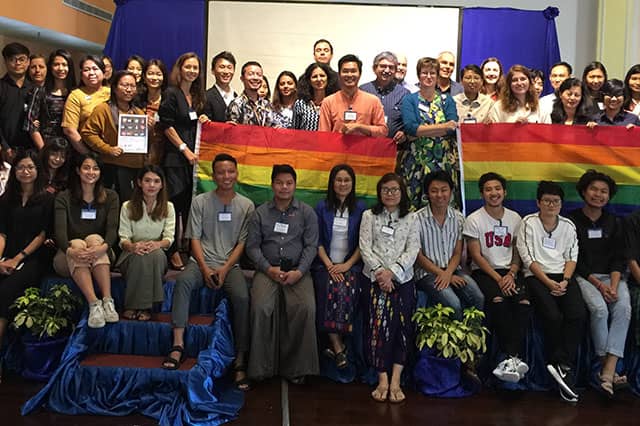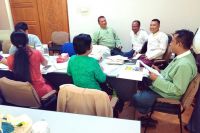Business Involvement is Essential if Myanmar is to Achieve LGBT+ Equality

About 60 participants from around 20 Myanmar and international businesses, as well as LGBT+ rights groups, trade union rights, international organisations, experts and lawyers discussed attended a workshop on 28/29 August at the Rose Garden Hotel, Yangon to discuss how businesses can support LGBT+ equality in Myanmar.
The workshop was co-organised by Colors Rainbow, the Institute of Human Rights and Business (IHRB), and Myanmar Centre for Responsible Business, with support from Open Society Foundations to:
Ensure businesses interested in combatting discrimination have an understanding of LGBT+ rights issues and advocacy in Myanmar
Encourage businesses to promote diversity and a culture of respect and equality both in the workplace and in the communities where they and their business partners operate
Connect businesses and LGBT+ rights advocates and promote cooperation
Learn from experience in the region, including of legal challenge to Article 377 of the Penal Code and the role which business has played
Identify possible follow up activities and sources of support
The first day of discussion included training by Colors Rainbow’s Hla Myat Tun for participants from business on Sexual Orientation, Gender Equality and Expression (SOGIE) and a briefing about the status of LGBT+ people in Myanmar’s workplaces. Kyawt Kaythi Win highlighted the development of training and other support from the Myanmar Business Coalition on Gender Equality. Ellen Maynes and Dean Laplonge of the IFC also shared relevant findings from their report on Respectful Workplaces and practical tgools for reducing bullying and harassment. Businesses had a chance to raise questions, share experiences with one another and also discuss the 2017 UN Standards of Conduct for Business which give guidance to businesses about how they can act to promote equality. Companies can commit to the Standards here.
International experts from India, Singapore and Thailand shared their experience on how business was working towards LGBT+ equality in their countries:
Salil Tripathi, Senior Advisor, Global Issues at the Institute for Human Rights and Business (IHRB) (one of MCRB’s co-founder organisations) spoke about the development of the Standards of Conduct which he co-authored.
Midnight Poonkasetwattana, Executive Director at the Asia Pacific Coalition on Male Sexual Health (APCOM) in Thailand
Remy Choo from Singapore, Singaporean lawyer active in the movement to repeal the law criminalizing same-sex relationships in Singapore, and in Pink Dot
Jayna Kothari, a lawyer who was among the senior advocates who had argued for almost 20 years for the repeal of Article 377 criminalizing same-sex relationships, which was successfully achieved in September 2018
Participants in the workshop were polled using Mentimeter on whether they thought legal reform in Myanmar was possible. 59% expected it to happen within 5 years, and a further 36% within 10 years. Asked which the biggest obstacle was to legal reform, the audience was evenly split between ‘lack of awareness of the issue’, ‘discriminatory attitudes amongst political leaders’, ‘discriminatory attitudes in society’ and ‘religious conservatism’. On the UN Standards, broadly equal numbers (30%) thought that the most important thing business could do was to respect LGBT+ rights in the workplace, and eliminate discrimination, with 20% favouring action by business in the public sphere.
The second half-day of discussion focussed on how other countries’ legal reform experience could be harnessed in Myanmar.
Read also
- Celebrating LGBT+ Equality on 17 May 2023
- MCRB and LBGT+ Organisations encourage businesses to Fly the Rainbow Flag for LGBT+ Equality on 17 May 2022
- Guide to Help Businesses Embrace LGBT+ Equality in Myanmar
- MCRB and Colors Rainbow Invite Businesses to Fly the Rainbow Flag for LGBT Equality on 17 May
- UN Standards of Conduct for Business in Tackling Discrimination against LGBTI People
 English
English မြန်မာ
မြန်မာ မြန်မာ (unicode)
မြန်မာ (unicode)












